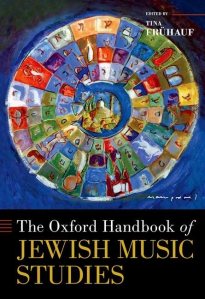You are currently browsing the tag archive for the ‘Diaspora’ tag.
The Oxford Handbook of Jewish Music Studies. Edited by Tina Frühauf. Oxford and New York: Oxford University Press. 2023.
Reviewed by Paul G. Feller-Simmons

The publication of The Oxford Handbook of Jewish Music Studies, edited by Tina Frühauf, marks a much-anticipated milestone. Released in November of 2023, the weighty tome attests to the rapidly changing landscape of the field, offering a comprehensive exploration of manifold subjects. With twenty-nine chapters plus an introduction penned by scholars at various stages of their careers, the Handbook truly mirrors the best facets of the field’s current state. While it would be a daunting task to do justice to every chapter within the confines of this review, particularly for an avowed early modernist such as myself, it suffices to say that the volume exudes scholarly rigor and innovation.
Read the rest of this entry »Der Zionismus in der Musik. Jascha Nemtsov. Jüdische Musik: Studien und Quellen zur jüdischen Musikkultur, vol. 6. Wiesbaden: Harrassowitz, 2009. 380 pp. ISBN 978-3-4470-5734-9
“Zionism was known as one of the few realized utopias in the twentieth century, probably the only one that in addition to addressing social concerns also had a distinct humanistic character,” writes Jascha Nemtsov in the epilogue to his monograph on the role of music in the Zionist movement in the first half of the twentieth century (349)[1]. A somewhat nostalgic tone permeates this truly amazing volume, which relates many facets of Jewish musical life to Zionism, commonly defined as a late nineteenth-century political movement dedicated to establishing a Jewish homeland. Nemtsov, who is well aware of the negative connotations of nationalism in the twentieth century (he quotes Ernest Gellner’s view of nationalism as “diabolical and lethal”), pleads for exception for Zionism. Probably even more forcefully than other nationalist movements in the twentieth century, he claims, Zionism put an emphasis on culture and thus brought about a Jewish cultural renaissance around the globe. It is these cultural, and specifically musical, ramifications of Zionism that interest Nemtsov, who presents Zionism as the unifying force that enabled a heterogeneous Jewish Diaspora culture to have a common focus. Nemtsov’s nostalgia derives from his sense that Zionism’s idealistic goal fractured as Zionism developed from an energetic political and cultural movement in the Diaspora to ossified official policy in modern Israel. According to Nemtsov, there were also other factors that made Zionism anachronistic by the second half of the twentieth century: the almost total annihilation of European Jewry, which served as the cradle of Zionistic ideals; the repression of Jewish culture in the Soviet Union, which was the center of Jewish life before the Revolution; a new Israeli culture that consciously tried to eliminate characteristics associated with the Diaspora; and a postmodern sensibility in the arts that fits uneasily with the optimistic ideals of Zionism. What Nemtsov does not mention as a contributing factor to the demise of the Zionist idea is the conflict between radically different visions of Zionism in present-day Israel, manifested in a less nostalgic account of Israel’s Zionist past by “new historians” such as Tom Segev.
Perspectives on Jewish Music: Secular and Sacred. Jonathan L. Friedmann, ed. Lanham, MD: Lexington Books, 2009. 162 pp. ISBN 978-0-7391-4152-6
Perspectives on Jewish Music, a collection of five essays addressing music in contemporary Jewish culture and personal Jewish history, is edited by Jonathan L. Friedmann, a cantor, string player, and author. In his introduction, Friedmann describes music as a tool of cultural preservation and emphasizes the role of music performance in defining Jewish personal and group identities throughout the Diaspora. Because of the many different contexts and conditions of Jewish life in the twentieth century, music has played a variety of roles and reflects a broad diversity of influences. This multiplicity of Jewish musical experiences is reflected in the disparate subjects of the book’s chapters.



